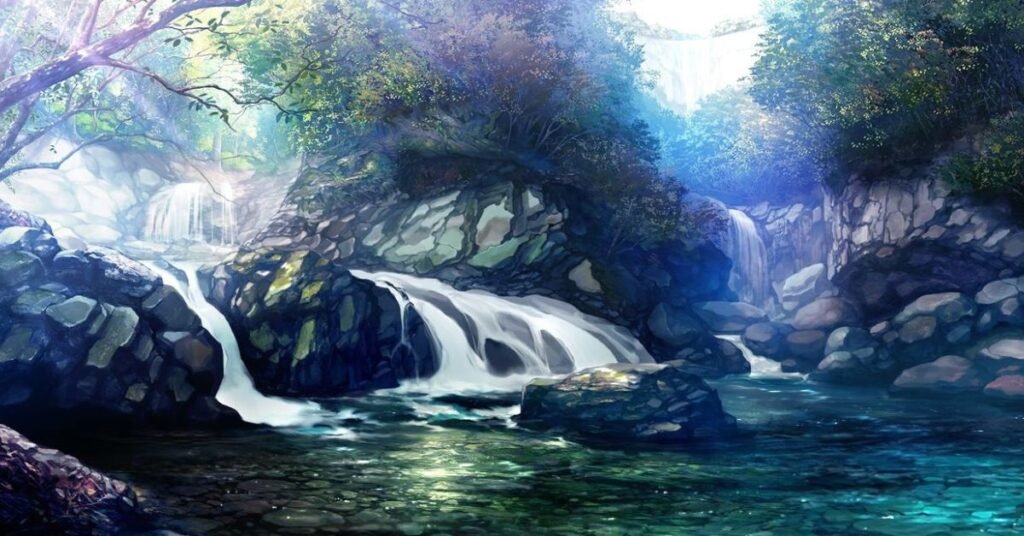Best Japanese Names Meaning Water
Japanese names inspired by water have a timeless appeal, rooted in the natural beauty and symbolism of water in Japanese culture. Water, with its adaptability, clarity, and depth, is often associated with qualities like resilience, serenity, and fluidity—traits highly valued in Japanese society.
Names that capture these elements often evoke a sense of peace and strength, embodying images of oceans, rivers, waves, and rain. In this guide, we’ll explore some of the best Japanese names meaning water, perfect for anyone who resonates with the calm, flowing, and transformative essence of this powerful natural element.
Female Japanese Names Meaning Water
Here’s a list of beautiful Japanese female names that carry meanings related to water, each with its kanji, pronunciation, and significance:
| Mizuha | Abundant water, symbolizing richness and fluidity in life. |
| Kaiko | Sea child, representing depth and mystery. |
| Minami | Beautiful wave, symbolizing grace and strength. |
| Sui | Refers to water, representing purity and adaptability. |
| Nami | Wave, evoking the rhythmic and powerful nature of the sea. |
| Umi | Ocean, representing vastness and the unknown. |
| Haruka | Distant, like the far-reaching expanse of the sea. |
| Mizuki | Beautiful moon reflecting on water, symbolizing clarity and reflection. |
| Kawa | River, representing life’s journey and continuous flow. |
| Yuki | Snow, a form of water, symbolizing tranquility and uniqueness. |
| Ryuu | Dragon, often linked with water in Japanese folklore. |
| Sora | Sky, which holds the water clouds, symbolizing vastness and freedom. |
| Nagisa | Beach, representing the meeting point of land and sea. |
| Kaede | Maple, like water, essential for life and growth. |
| Izumi | Spring or fountain, representing renewal and source of life. |
| Shizuku | Droplet, symbolizing the simplicity and essential nature of water. |
| Yamabuki | Mountain river, representing natural beauty and flow. |
| Misaki | Beautiful blossom, nurtured by water, symbolizing growth and beauty. |
| Kana | Powerful water, representing strength and flexibility. |
| Suzume | Sparrow, which often symbolizes water in Japanese culture. |
| Tsukiko | Moon child, like the moon’s effect on tides, symbolizing influence. |
| Umika | Ocean flower, representing beauty and depth. |
| Reina | Wise, like the ancient and wise nature of the sea. |
| Hotaru | Firefly, often found near water, symbolizing light and nature’s beauty. |
| Aoi | Hollyhock, which needs water to flourish, symbolizing dependency and beauty. |
| Akari | Brightness, like light reflecting off a water surface. |
| Hina | Sunlight, essential for water’s life-giving qualities. |
| Miyu | Beautiful gentleness, like the soft touch of water. |
| Sayuri | Small lily, which often grows in water, symbolizing beauty and purity. |
| Yuna | Gentle, like the soothing nature of water. |
Male Japanese Names Meaning Water
Here’s a collection of strong and meaningful Japanese male names associated with water, each accompanied by its kanji, pronunciation, and significance:

| Mizuho | Means abundant water, symbolizing prosperity and richness in life. |
| Kai | Refers to sea, representing vastness and the mysteries of the deep. |
| Minato | Translates to harbor, symbolizing a safe haven and tranquility. |
| Suijin | Named after the Shinto god of water, embodying power and fluidity. |
| Nagisa | Means beach, evoking calmness and the soothing nature of the sea. |
| Kaito | Signifies sea or ocean, representing exploration and depth. |
| Ryuunosuke | Dragon with water element, symbolizing strength and adaptability. |
| Haru | Connotes spring, a season often associated with fresh water and renewal. |
| Mizuki | Beautiful moon reflecting on the water, symbolizing clarity and reflection. |
| Kawa | River, representing life’s journey and constant flow. |
| Umi | Means ocean, symbolizing vastness and mystery. |
| Takumi | Artisan, often linked to water’s craft and creation. |
| Sousui | Refers to twin waters, symbolizing harmony and balance. |
| Hayase | Fast flowing, representing swiftness and agility like water. |
| Issei | First generation, like the origin of a water source. |
| Mizuhiko | Water child, symbolizing purity and innocence. |
| Ryuu | Dragon, often associated with water in Japanese mythology. |
| Sora | Sky, which holds the water clouds, symbolizing vastness and serenity. |
| Nami | Wave, representing the power and rhythm of water. |
| Suigetsu | Water and moon, symbolizing the reflection and beauty of water. |
| Tsukasa | Manager or director, like the guiding flow of water. |
| Minamo | Water surface, representing stillness and calm. |
| Rei | Cold, like the refreshing aspect of water. |
| Kensui | Healthy water, symbolizing vitality and purity. |
| Takuya | Water valley, representing depth and hidden beauty. |
| Shinrai | Trust, like the reliability of a water source. |
| Yasu | Peace, often associated with the tranquil nature of water. |
| Hiroshi | Generous, like the nourishing quality of water. |
| Katsumi | Victorious beauty, like the graceful flow of water. |
| Suihei | Water level, representing balance and evenness. |
Famous Japanese Names Meaning Water

| Ryoko | Refreshing child, like the rejuvenating quality of water. |
| Kaito | Sea, ocean, representing adventure and exploration. |
| Minori | Beautiful harbor, symbolizing safety and tranquility. |
| Narumi | Beautiful sea, representing the beauty and vastness of the ocean. |
| Haru | Spring, a season often associated with fresh water and new beginnings. |
| Mizuki | Moon water, symbolizing the reflection and mystery of water. |
| Kana | Powerful and vigorous, like the forceful flow of water. |
| Sora | Sky, representing the boundless nature of both sky and water. |
| Nagisa | Beach, evoking the serene and calming nature of the sea. |
| Mizuho | Abundantly growing grains, water being essential for growth. |
| Kai | Sea, ocean, representing depth, mystery, and the unknown. |
| Rina | Jasmine or small bell, often associated with the purity of water. |
| Kawa | River, signifying life’s path and the continuous flow of water. |
| Ryuu | Dragon, linked with water in Japanese mythology, symbolizing power and grace. |
| Yuki | Snow, a serene and unique form of water. |
| Hiro | Generous, like the giving nature of water. |
| Izumi | Fountain or spring, representing the source and renewal of life. |
| Ame | Rain, essential for life, representing nourishment and growth. |
| Minato | Harbor, symbolizing refuge and the convergence of journeys. |
| Suijin | Water deity, embodying the power and importance of water. |
| Nami | Wave, representing the rhythmic and relentless nature of water. |
| Umika | Ocean and flower, symbolizing the beauty and depth of the sea. |
| Hama | Beach, where the water meets the land, symbolizing interaction and balance. |
| Takuya | Water valley, representing hidden depths and beauty. |
| Suzume | Sparrow, often associated with water in Japanese culture. |
| Haruka | Distant, like the far-reaching ocean, representing vastness and possibility. |
| Hotaru | Firefly, found near water, symbolizing nature’s interconnected beauty. |
| Rei | Cold, refreshing like a splash of cold water. |
| Shizuku | Droplet, representing the essential, pure form of water. |
| Kaito | Again, for its popularity, sea, ocean, embodying exploration and depth. |
Read more : Discover 450+ Cow Name
Conclusion
These Japanese names meaning water not only embody the essence of water but also feature prominently in Japanese culture, particularly in anime, literature, and popular media. They evoke a range of emotions and themes, from adventure and serenity to reflection and growth.
Choosing a name from this list can connect you to the beauty and significance of water in Japanese culture while also honoring the characters and stories that have made these names famous.
FAQs
What is the royal Japanese name?
Japan’s current emperor is Naruhito. On May 1, 2019, he succeeded to the Chrysanthemum Throne following the abdication of his father, Emperor Akihito.v
Why do Japanese say San and Kun?
Kun. When addressing males who are younger or the same age as the speaker, “~ kun (~君)” is used, which is less courteous than “~ san.” Female inferiors may be addressed by a male using “~ kun,” typically in workplaces or educational institutions. It can be appended to given names as well as surnames.
Is Japanese or Chinese harder?
For an English speaker, Chinese and Japanese are both very difficult languages, but in different ways. Chinese is easier to understand in terms of word order and grammar, while Japanese is difficult. Chinese tones will take a long time to learn, while Japanese pronunciation is not very important.







